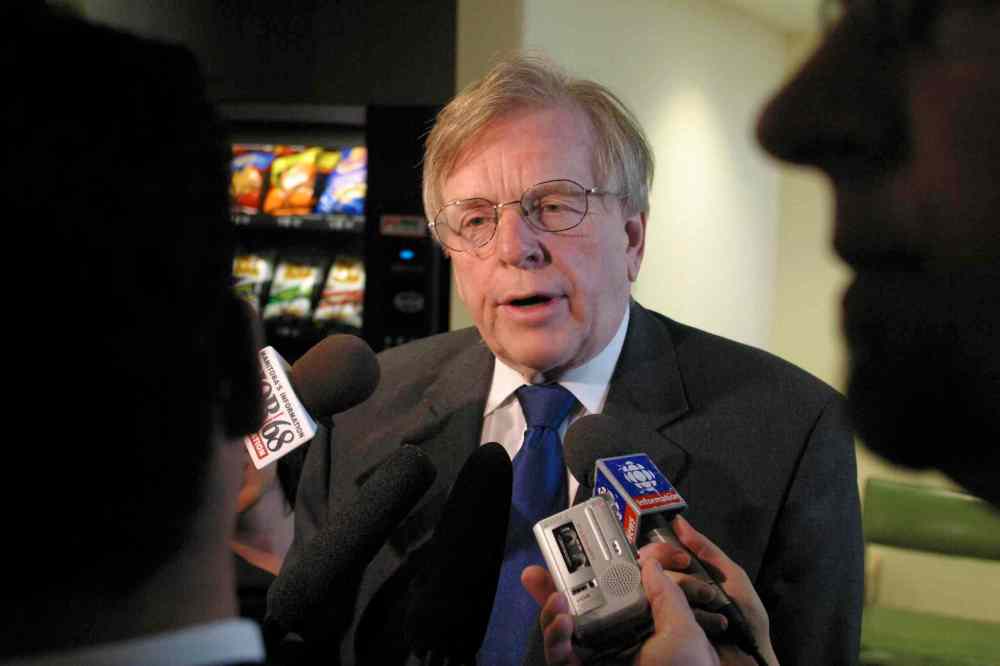Harvard always had journalist’s intense curiosity, even while in office
Advertisement
Read this article for free:
or
Already have an account? Log in here »
To continue reading, please subscribe:
Monthly Digital Subscription
$0 for the first 4 weeks*
- Enjoy unlimited reading on winnipegfreepress.com
- Read the E-Edition, our digital replica newspaper
- Access News Break, our award-winning app
- Play interactive puzzles
*No charge for 4 weeks then price increases to the regular rate of $19.00 plus GST every four weeks. Offer available to new and qualified returning subscribers only. Cancel any time.
Monthly Digital Subscription
$4.75/week*
- Enjoy unlimited reading on winnipegfreepress.com
- Read the E-Edition, our digital replica newspaper
- Access News Break, our award-winning app
- Play interactive puzzles
*Billed as $19 plus GST every four weeks. Cancel any time.
To continue reading, please subscribe:
Add Free Press access to your Brandon Sun subscription for only an additional
$1 for the first 4 weeks*
*Your next subscription payment will increase by $1.00 and you will be charged $16.99 plus GST for four weeks. After four weeks, your payment will increase to $23.99 plus GST every four weeks.
Read unlimited articles for free today:
or
Already have an account? Log in here »
Hey there, time traveller!
This article was published 11/01/2016 (3595 days ago), so information in it may no longer be current.
John Harvard was my friend, though that friendship began under far from favourable circumstances. I was then working in the office of Conservative opposition leader Sidney Spivak in the Manitoba Legislature. Some controversial issue had arisen requiring a reaction from the office, but Spivak was out of the country and in his absence I was the staff person who — it was assumed — knew the most about the subject in question. I was asked to go on the air with John Harvard when he was working for CJOB. This was not, in my view, a plum assignment.
Harvard in those days was regarded as a member of the tough school of journalism that tended to assume that most politicians were guilty of something until they proved otherwise. I remember nothing of the interview beyond the fact that, so far as I could judge, I had suffered no mortal wounds. When it was over, we had an amiable chat and Harvard bade me farewell till the next time.
As it turned out, there were many “next times” in which I was present on my own behalf, either as an academic or, for a time, a Winnipeg city councillor. In both these roles, I was subjected to cordial but intense questioning: he asked questions about things he assumed his listeners would be interested in knowing about, but frequently they went beyond that. He had an intense need to understand things, to know what was going on and to grasp how the person sitting opposite came to conclusions that differed from his own.

Much of this, of course, reflected his own background and his own needs as a broadcast journalist, but this desire to see and understand things was endless, and no less so than when he moved from one kind of public realm to another, from journalist to Member of Parliament. In those days, Harvard and I would occasionally meet for lunch or dinner in Ottawa, as I carried on my duties as the Manitoba member of the Historic Sites and Monuments Board of Canada.
As an MP, Harvard retained his intense curiosity about what was happening and especially in learning about something new. To be ahead of breaking news brought out the journalist in him and he enjoyed knowing in advance what everyone would be reading about over breakfast the next day. It was always clear his commitment to social justice trumped everything else.
When, Harvard was named lieutenant-governor of Manitoba, he was suddenly required to be non-partisan. However, for the journalist and broadcaster — for whom politics and politicians were life-blood — being cut off from talking and speculating about politics and policy was to deny the very nature of nature. Eventually he recruited two people — a retired journalist and a retired senior provincial public servant — to meet with him privately to talk about what was happening in politics and government. I was eventually invited to attend these regular ongoing coffee sessions.
When John’s time in Government House ended, we relocated to his new home and, with increased and diverse numbers, continued to meet regularly until a month or two ago, when his illness finally made that impossible. I rather suspect that we will regroup and carry on. It’s hard to imagine the conversations without him, but it’s equally clear that we, the “Harvard group,” could pay him no greater tribute.
Harvard was one of those people who, in the words of the poet Walter Savage Landor, “warmed both hands before the fire of life.” Along with his family, those of us who counted him a friend and shared that warmth will not forget him.
William Neville is a Winnipeg writer. John Harvard was his friend for nearly 40 years.



